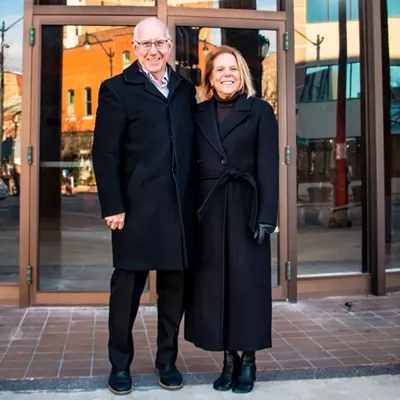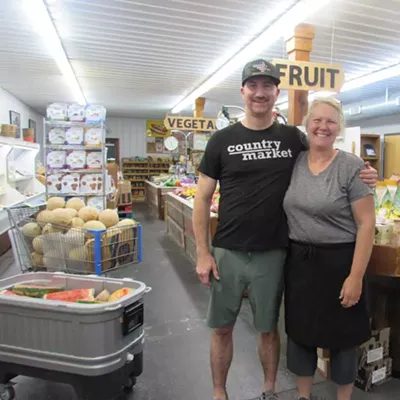Tariffs and staffing are two major challenges for area manufacturers
Article and photos by DAVID BLANCHETTE
From diodes to doughnuts, manufacturers in the Springfield area make many different things and supply steady employment. They are established, often multi-generational members of the communities in which they are located. But manufacturers are also part of a volatile segment of the market, more susceptible to foreign policy decisions, government regulations and the growth or stagnation of state economies.
The U.S. Bureau of Labor Statistics has noted an increase in the number of manufacturing jobs nationwide during the past few years, particularly in the durable goods sector. “Made in America” is apparently making a comeback, and several area manufacturers are taking advantage of that trend. However, it’s hard to make something if you don’t have the employees to do so, and local industries also report difficulty attracting enough qualified workers.
We’ve taken a look at four different types of area manufacturers to get their take on the segment’s opportunities and challenges, as well as that coveted “Made in America” designation.
Henry Technologies Inc., Chatham - Manufacturer of flow control and pressure vessel components for the commercial refrigeration and air conditioning industry, 90 employees
The “Made in America” label is important to Henry Technologies of Chatham, which traces its history back to Chicago in 1914 and a man who built components for Model T Fords.
“The heart and soul of our company was built on the dreams of an American entrepreneur who had a passion for the value of being made in America,” said Hanna Robinson, human resources manager at Henry Technologies. “I feel that we contribute to the way people view made in America products by exceeding our customers’ expectations through excellence in all aspects of the products and services we provide.”
The Chatham facility is owned by Henry Group Industries, whose corporate offices are located in Hong Kong, but inside you’ll find local men and women machining, welding, powder coating, testing and packing a myriad of fittings from small to very large for commercial customers around the globe, including the U.S. government.
Henry is always on the lookout for new workers with the skills needed to make commercial refrigeration and air conditioning components. Robinson said the company partners with Capital Area Career Center to attract potential welders to join the firm’s production team. Henry has also worked with the University of Illinois to host an on-site intern work study program in the engineering department, where products are designed from scratch to meet customers’ unique needs. Employment agencies are utilized to fill some other key positions, and Robinson said the company puts a lot of effort into retaining employees.
Technology has been both a blessing and a challenge for Henry, Robinson said. The firm can communicate immediately and effectively with customers around the globe, and technology helps the company to identify risks and head off potential problems so supply chain interruptions are minimized. But technology also requires additional resources to implement and support, a cost that must be borne by the manufacturer.
One of the most demanding challenges the company faces are government regulations pertaining to global warming compliance standards for refrigerants.
“It is important today as a global supplier in the industry, that we produce a product of high quality that supports environmentally safe and effective standards to our customer base,” Robinson said. “This can be very challenging, due to federal regulations and additional operating expenses for a global manufacturer.”
“We must have complete visibility throughout our production and supply chain procedures. This is required for industry standards, as well as for our customers’ compliance measures,” Robinson said.
Robinson also noted that those in the manufacturing industry can never become complacent, because there’s always another firm itching for business.
“We must always stay relevant in our industry with product development abilities as well as having a solid supply chain of inventory available,” Robinson said. “We must always be customer- focused in order to be competitive in the industry and to provide the best value to all stakeholders.”
_____________________________________________________________
Mel-O-Cream Donuts International, Springfield - Food products manufacturer, 80 employees
David Waltrip loves Mel-O-Cream’s chocolate long johns and white-iced cinnamon rolls, but he knows the company isn’t the only manufacturer that produces these delicacies.
“Doughnuts have become a commodity in the industry, and we don’t view them that way,” said Waltrip, the president and CEO of Mel-O-Cream. “We try to be the best in the market. Our products taste fresher longer than anybody else’s, and we have customer service and support that the majority of our competitors don’t provide.”
However, this commitment to quality has limited the growth of Mel-O-Cream, which has been producing doughnuts in the Springfield area since 1932.
“When you live in a commodity world and people are so price-sensitive, there are only a certain number of customers who feel that it’s worth the extra money to try to do business that way,” Waltrip said. “But that’s one of our core values, and we don’t forget you after we sell you our product.”
Most of Mel-O-Cream’s products are cooked at their plant on Springfield’s far southwest side and then frozen to be shipped to stores, where the donuts are finished and sold to consumers under the store’s brand name. Because of this, many doughnut fans in the Midwest are eating Mel-O-Creams and may not realize it, Waltrip said.
Mel-O-Cream is being asked to do more to its doughnut products before they leave the Springfield plant so the stores that sell them have less preparation work to do. Waltrip said that’s because the stores are experiencing a labor shortage, a dilemma that Mel-O-Cream also faces.
“It can be challenging for us to get skilled labor,” Waltrip said. “We try a multitude of sources: social media, word-of-mouth, job fairs, every angle we can come up with, trying to be creative all the time trying to figure out ways to recruit workers.”
Shortages of drivers in the trucking industry inspired Mel-O-Cream to buy its own trucks and hire its own drivers to deliver products. Waltrip said the company tries to retain workers by paying fair wages and benefits and by making the plant a great work environment.
Waltrip has lived in the Springfield area his entire life and has watched manufacturers come and go. Unfortunately, it’s been mostly “go.”
“We don’t have enough manufacturers in Springfield. There are lot of opinions about why or why not, but the results out-speak all of the opinions,” Waltrip said. “You see government and hospitals growing, but you don’t see that from manufacturing.”
“I travel a lot in my business, and in places like Iowa and Texas you see a lot of new growth, a lot of construction,” Waltrip said. “It makes me scratch my head and think, ‘What are we missing compared to these locations?’”
_____________________________________________________________
CCK Automations, Jacksonville - Electronics manufacturer, 86 employees
“You ought to see the American flag we fly on our production floor,” said CEO J.J. Richardson.
CCK Automations is locally owned and the company designs, engineers and manufactures electronic components, a process most people probably associate with China. But the Jacksonville firm is proudly American and is glad to have a hand in the return of electronics manufacturing to the United States.
“A lot of the electronics manufacturing was outsourced to China a few years ago, but a lot of it is trying to come back to the U.S.,” Richardson said. “I think President Trump has done a great job by imposing the tariffs. When I first saw those I thought it was going to kill our business, but it’s actually been good for our business.”
“We’ve seen customers decide to bring product back to the United States versus paying that tariff, so there’s no business advantage to move production overseas,” Richardson said.
CCK also has an injection molding facility, part of a business it acquired in 2015, where they design and make plastic component parts for electronics. CCK also makes plastic components that don’t go into electronics, like field tile connectors.
“Our customers want us to provide more solutions. We used to just make the electronic circuit boards for our customers,” Richardson said. “Now we are placing them in enclosures, making them weatherproof; we are doing a lot of value-added processes. We are becoming more vertically integrated to fulfill our customers’ desires and wants.”
Most of the work cells in CCK’s 149,000-square-foot facility are easily movable, and it’s not uncommon for employees to quickly reconfigure the huge, bright, clean work floor to produce a brand new product or add production capacity for an existing one. Richardson said CCK has a global client base that includes the agriculture, food, consumer electronics, oil and gas industries.
CCK employees work four 10-hour days per week in two shifts and Richardson said they receive competitive wages. But the company is not immune to the problem it shares with other area industries and that is the lack of a readily available workforce.
“We have talked to two local colleges to try and figure out how we can work a specific program for our needs,” Richardson said. “The problem is, they typically don’t offer programs we need for our area of electronics. Illinois College has just started an engineering program and that’s something we are looking at for internships in the future.”
Richardson and his wife are Jacksonville natives and they intend to stay in the community, even though keeping a successful business going in Illinois keeps getting tougher.
“The Illinois business environment is incredibly hurtful with the taxes and the minimum wage going to $15 an hour,” Richardson said. “The minimum wage doesn’t just affect the entry-level worker, it affects everybody. That is a migration that goes through the pay scale, all the way up the food chain. I think you’ll see a trend for people to look outside of Illinois.”
_____________________________________________________________
Solomon Colors, Inc., Springfield - Concrete industry products manufacturer, 100 employees
The concrete pigments the business manufactures are primarily red, yellow and black, but the fourth-generation Springfield family business of Solomon Colors, Inc. is red, white and blue at heart.
“There are two companies manufacturing granular pigment in the United States. Solomon Colors is one and the other is importing granular pigment from Germany and China,” said Richard Solomon, board chairman and CEO. “Producing ‘Made in America’ granular pigment does make a difference, knowing that our customers can rely on our quality control.”
Solomon Colors began pulverizing hematite iron ore in Springfield in 1927, and today the sprawling complex at the site of the old Springfield power plant still produces iron oxide pigments in dry powder, liquid slurry and granular forms for coloring concrete products. The company also produces decorative concrete products under the Brickform brand including hardeners, color release powders, stains, overlays, sealers, coatings and imprinting devices. All of the products are manufactured at Solomon’s Springfield, Illinois and Rialto, California plants.
Solomon also designs and builds automated dispensing equipment so concrete plant operators can add colors directly into mixing trucks.
The fact that Solomon’s competitors import much of their raw material from China has given the Springfield manufacturer an advantage, especially since a 10% tariff was imposed in September 2018.
“We import synthetic iron oxide in from China, but we also bring it in from Germany and Brazil. We have positioned ourselves so we don’t put all of our eggs into one basket,” Solomon said.
But that doesn’t mean Solomon won’t do business with China. On the contrary, the company is looking at establishing a manufacturing operation in that country to produce decorative concrete products that will only be sold in China, not shipped to the United States.
“The reason we are doing it is because there is a 35% tariff for us to ship product into China from the United States,” Solomon said. “I can understand the purpose of the tariff; I have seen it from both sides. But there shouldn’t be a 35% tariff on our stuff and only 10% on stuff going the other way. It’s a position that I support the administration on for that purpose.”
More than 51% of Solomon Colors stock is owned by employees, with the rest owned by the Solomon family, including Richard’s son, Adam, who is the company president and chief operating officer. Adam Solomon said that finding and keeping quality employees is a constant challenge at the Springfield operation.
“One good thing about the economy being good is that people have jobs, but one negative is that it’s hard to find good people,” Adam Solomon said. “All we want is people who will show up and want to work, and we’ll hire and keep them. But it’s actually hard to find people that even want to do that.”
The Solomon president said the company has used recruiters, word-of-mouth, member associations, temporary employment agencies and has had discussions with area high schools and colleges to try and keep jobs filled. Many of the Solomon manufacturing jobs are hands-on, but others require special training or degrees in industry compliance or chemistry.
“A lot of the people we are finding are out-of-state, and it is kind of difficult to find someone and convince them to move to Illinois. The state’s tax and business climate is definitely part of it,” Adam Solomon said. “You also can’t change the fact that Springfield is not Chicago. That’s never going to happen, so you have to find people that want to live in a mid-sized town.”
“But I think living in a town this size is a good thing, and the people who have come to Springfield appreciate the community,” Adam Solomon said.













